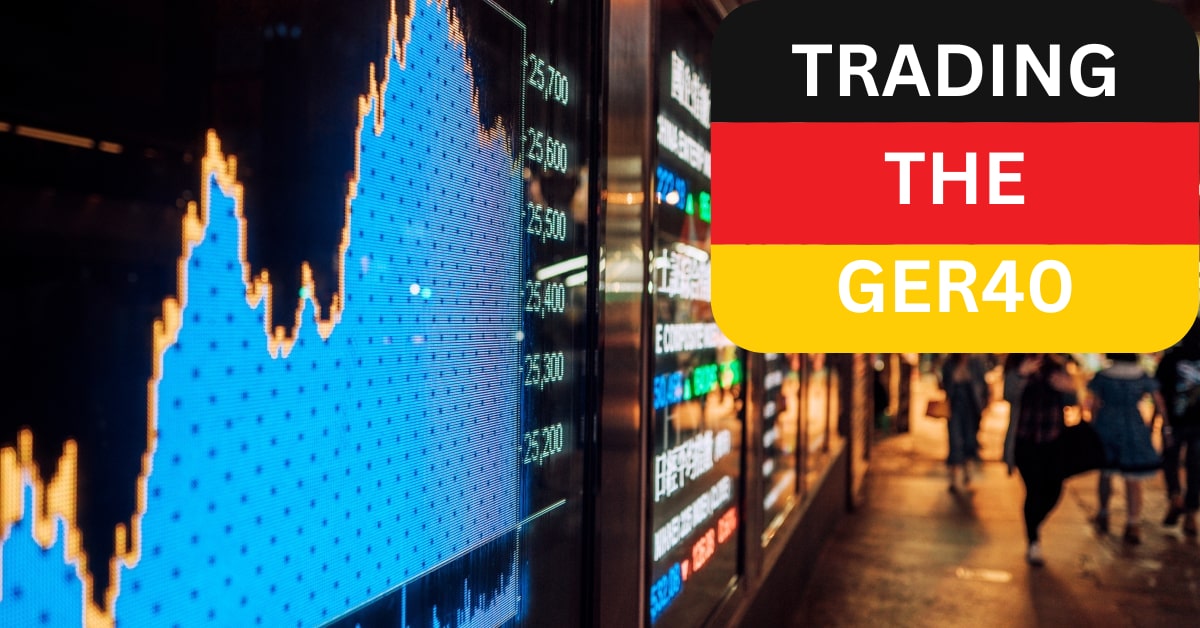- English
- Italiano
- Español
- Français
Analysis
Trading the GER40: Insights into Germany’s Premier DAX Index
What is the GER40 Index?
The GER40 Index, also known as the DAX (Deutscher Aktien Index), is a capitalization-weighted index that tracks the performance of the 40 largest and most liquid German companies listed on the Frankfurt Stock Exchange. The weight of each company in the index is determined by its market capitalization, meaning that larger companies have a greater impact on the index's performance.
It is important to note that the GER40 is a total return index. This means that the calculation of the index assumes that all dividends paid out by the companies in the index are reinvested back into the index. This reinvestment of dividends contributes to the overall growth of the index and provides a more accurate picture of the performance of the German stock market.
The index is calculated in real-time and provides a valuable snapshot of the overall health and performance of the German stock market.
Understanding the market cap of the German stock market
Market capitalization, or market cap, is a key concept when analysing the GER40 Index. It represents the total value of a company's outstanding shares, calculated by multiplying the company's share price by the number of outstanding shares. The market cap of the German stock market is the sum of the market caps of all the constituent companies in the GER40 Index. This metric provides insights into the size and significance of the German market.
The companies included in the GER40 Index are carefully selected based on their market cap, trading volume, and sector representation. The index aims to provide an accurate representation of the German economy by including companies from various industries such as automotive, financial services, technology, and healthcare.
How is the GER40 Index calculated?
The calculation of the GER40 Index, also known as the DAX, involves several steps and considers both market capitalization and total return:
- Total Market Capitalization: The market capitalization of each company in the index is determined by multiplying its share price by the number of outstanding shares. The total market capitalization of the index is then calculated by summing the market capitalizations of all 40 constituent companies.
- Index Divisor: To ensure continuity and consistency in the index's value over time, an index divisor is calculated. This divisor is adjusted periodically to account for corporate actions such as stock splits, dividends, and rights issues that would otherwise artificially inflate or deflate the index value.
- Index Value: The GER40 Index value is calculated using the following formula:
- Index Value = (Sum of Market Capitalization of Constituent Companies / Divisor) x Base Value
- The base value is a historical value chosen to provide a starting point for the index. It has no impact on the relative performance of the index over time.
- Total Return: The total return of the GER40 Index reflects the change in its value over a specific period, including both price appreciation and reinvested dividends. It is calculated by taking the current index value and dividing it by the index value at the beginning of the period, then subtracting 1 and expressing the result as a percentage.
Here's an example:
- Assume the total market capitalization of all 40 DAX companies is €1,000,000,000,000 (one trillion euros) and the divisor is 100.
- The initial base value is set to 100.
- Using the formula, the index value would be: (1,000,000,000,000 / 100) x 100 = 10,000,000,000
- If after one year, the total market capitalization becomes €1,100,000,000,000 and the divisor remains unchanged, the new index value would be 11,000,000,000.
- The total return for the year would be: (11,000,000,000 / 10,000,000,000) - 1 = 10%, indicating a 10% increase in the index value over the year.
- The base value, which is typically set at 1,000, serves as the starting point for the index. The index value is then updated throughout the trading day to reflect the changing market conditions.

Historical performance of the GER40 Index
Analysing the historical performance of the GER40 Index can provide valuable insights for traders. Over the years, the index has experienced both bull and bear markets, reflecting the overall health of the German economy. By studying the historical performance, investors can identify trends, patterns, and potential investment opportunities.
It is important to note that past performance does not guarantee future results. However, historical data can be used as a reference point for understanding the GER40 Index's volatility, returns, and long-term growth potential. Investors should consider factors such as economic indicators, geopolitical events, and company-specific news to make well-informed investment decisions.
GER40 companies: An overview of the major players
The GER40 Index, formerly known as the DAX30, comprises the 40 largest and most influential companies in Germany. These companies represent a diverse range of sectors and play a vital role in the country's economy. (Note: DAX expanded from 30 to 40 stocks in 2021).
It's important to note that the composition of the GER40 undergoes quarterly rebalancing to ensure it accurately reflects the German stock market. This means that companies can be added or removed from the index, and the weightings of existing companies can be adjusted, based on their market capitalization and other factors.
Let's take a closer look at some of the companies currently in the GER40 Index:
- Volkswagen AG (VOW3.DE): A global automotive giant known for its popular brands like Volkswagen, Audi, and Porsche.
- Siemens AG (SIE.DE): A multinational conglomerate specialising in industrial engineering, energy, and healthcare.
- Bayer AG (BAYN.DE): A leading pharmaceutical and life sciences company with a strong focus on innovation.
- Deutsche Bank AG (DBK.DE): One of the largest financial institutions in Germany, offering a wide range of banking and financial services.
- SAP SE (SAP.DE): A software company that provides enterprise resource planning (ERP) solutions to businesses worldwide.
These are just a few examples of the companies that currently make up the GER40 Index. Due to the quarterly rebalancing, the specific companies making up the index can change over time. However, each constituent company plays a crucial role in shaping the index's performance and represents a unique investment opportunity.
Trading the GER40 Index: Strategies and Considerations
The GER40 Index presents opportunities for active traders seeking to capitalise on short-term price movements. Here are some popular trading strategies:
- Day Trading: This strategy involves opening and closing positions within the same trading day, aiming to take advantage from intraday price fluctuations. Traders utilise technical analysis tools like moving averages, support and resistance levels to identify potential entry and exit points.
- Scalping: A more specialised form of day trading, scalping involves benefiting from very small price movements by entering and exiting positions quickly and frequently. This strategy requires significant discipline, fast execution, and tight risk management due to the high number of trades involved.
- CFD Trading: CFD trading allows you to speculate on the price movements of the GER40 Index without owning the underlying assets. Leverage can be used which can magnify potential gains and losses.
Remember:
- These strategies are inherently riskier than long-term investing due to their short-term focus and potential for leverage.
- Thorough research, understanding of market dynamics, and sound risk management are crucial for success.
- Consider factors like your risk tolerance, trading experience, and available capital before engaging in any of these strategies.
Tracking the GER40 Index: Tools and resources
To effectively track the GER40 Index and stay updated on its performance, investors can utilise various tools and resources. Here are some options:
- Financial news platforms: Websites and mobile apps that provide real-time market data, news, and analysis can be valuable resources for tracking the GER40 Index. Examples include Bloomberg, Reuters, and CNBC.
- Trading platforms: Many online trading platforms offer real-time GER40 Index quotes, charts, and analysis tools. These platforms enable investors to monitor the index's performance and execute trades if desired.
- Index provider websites: The official website of the index provider, such as Deutsche Boerse for the GER40 Index, often provides detailed information about the index, its methodology, and constituent companies.
By leveraging these tools and resources, investors can stay informed and make timely investment decisions based on the GER40 Index's performance.
Conclusion: The significance of the GER40 Index in the global market
The GER40 Index holds significant importance in the global market as it represents the performance of the largest and most influential companies in Germany. By staying informed, utilising relevant tools and resources, and adopting suitable investment strategies, investors can potentially navigate the GER40 Index effectively.
The material provided here has not been prepared in accordance with legal requirements designed to promote the independence of investment research and as such is considered to be a marketing communication. Whilst it is not subject to any prohibition on dealing ahead of the dissemination of investment research we will not seek to take any advantage before providing it to our clients.
Pepperstone doesn’t represent that the material provided here is accurate, current or complete, and therefore shouldn’t be relied upon as such. The information, whether from a third party or not, isn’t to be considered as a recommendation; or an offer to buy or sell; or the solicitation of an offer to buy or sell any security, financial product or instrument; or to participate in any particular trading strategy. It does not take into account readers’ financial situation or investment objectives. We advise any readers of this content to seek their own advice. Without the approval of Pepperstone, reproduction or redistribution of this information isn’t permitted.
